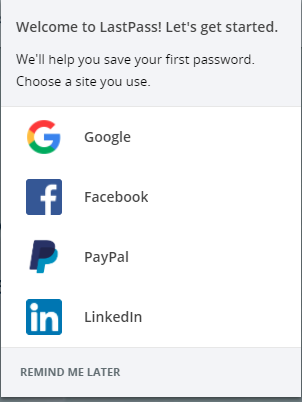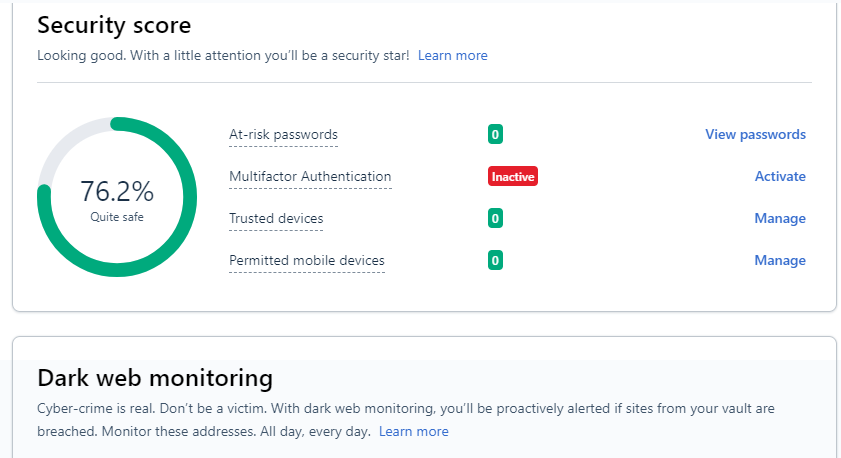LastPass Review
The list of online services and social media platforms we use on a daily basis is getting longer and longer. Facebook, Instagram, LinkedIn, Dropbox, Gmail - just to name a few. Remembering a password for each is nigh impossible, but using the same password for multiple sites is a huge security risk.
LastPass saves you the trouble of remembering all those passwords by storing them in one place that’s protected by high-end encryption and multi-factor authentication. Single users can enjoy these password-saving capabilities for free, while the company’s low-cost paid plans provide encrypted storage, password sharing, a LastPass authenticator app, and priority tech support.
Check out our LastPass review below for a detailed look at this password manager’s features, capabilities, and potential pitfalls.
- All-in-one data management
- Password generator
- Dark web monitoring
- Multifactor authentication
- Easy to use
- Fair pricing model
- Advanced security tools
- Free to try
- Complicated password importing
- Automatic password changer is limited
Features
LastPass is a dedicated password manager that stores your passwords in one place across all your devices. It comes in the form of both a LastPass browser extension and an app, allowing you to easily save and access passwords no matter which device you’re using.
Besides protecting and storing your secure passwords, LastPass can also hold your credit card and banking information, making it an all-in-one place to save all your valuable information.
Master Password
To start off our LastPass password manager review, let’s take a look at how the service works. At the outset, you need to choose a master password - one that will be used to access the LastPass service and behind which all of your passwords are stored. This is the only password you’ll have to remember - LastPass will store all the other ones for you.
As this is the master password, it’s of utmost importance that you do not forget or misplace it. In order to make sure that your master password is strong enough, LastPass has strict requirements on what that password must contain: at least 12 characters, capital letters, and numbers.
During our review of LastPass, we were happy to see the option to include a reminder for your master password - something that will help you remember it in case you forget. LastPass also features a number of security measures that serve to keep your master password safe. You can tell LastPass to remind you to change your master password after a certain period in order to prevent your security being compromised. Additionally, you can change when you want to be prompted for the master password - when you access a site, access a form fill, or log in to a site, for example.
Password Saving
Of course, we wouldn’t be able to review LastPass password manager without mentioning password saving. This service is meant to keep all your passwords safe and secure under one roof. After defining the account settings for your LastPass account, the password manager will help you save your first password. It will suggest some popular sites, like Facebook.

LastPass will then automatically take you to the target site, log you out if you’re currently logged in, and take you to the username/password prompt screen. After you successfully log in, the LastPass browser extension or app will offer to save your secure password. Passwords can be saved individually or added to custom folders and sub-folders.
For example, during our LastPass security review, we sorted passwords into folders like ‘Social Media,’ ‘Email,’ and the like. By doing so, you can even have multiple passwords saved for one site, which can be useful if you’re sharing an account or running multiple accounts for your business. The LastPass password generator can create strong passwords for you if you want to be extra safe.

Notes and Addresses
LastPass can save much more than just your passwords. Not only can you import passwords, but you can input all sorts of information into the password manager, including notes and contacts/addresses. This info can then be accessed via the LastPass ‘My Vault’ dashboard.
While most of us already keep contacts and valuable notes on our phone, having them saved in the LastPass web vault allows you to access them from any device, and it keeps them safe from prying eyes.
In our LastPass app review, we found this feature especially useful when you’re handling sensitive information, and you don’t feel that your devices and/or Google accounts are safe enough to hold them. Valuable business contacts are a perfect example of something you wouldn’t want to be leaked. These, along with other information, will be kept safe by LastPass.
Credit Cards and Bank Accounts
Besides passwords, notes, and contacts, LastPass can also hold your credit card and bank account information. These details can be added manually or saved after you type in the info on a certain site or app.
During the course of our LastPass 4.0 review, we found saving credit card information to be a piece of cake. Similar to Google’s feature, it will pop up whenever you add your credit card info somewhere and offer to save it for you.
Beyond the usual information - like card number, expiration date, and card name - you can also leave notes or stick additional attachments to each card you save. LastPass will let you choose between saved cards whenever you access a credit card fill-in form.
Saving bank accounts is equally easy. Besides the name of the bank and your account number, you can add SWIFT and IBAN codes, the branch address and phone number, PIN code, and other details. As with previous types of information mentioned in our password manager LastPass review, LastPass can autofill your bank account info when it detects the appropriate fill-in form.
Security
Of course, all of these great features would be useless without sophisticated security. Luckily, LastPass employs a whole array of security measures to keep all of your information safe.
The first layer of security is AES 256-bit encryption, which serves to encrypt all communication between you and the provider. Moreover, LastPass uses hash technology - a system on which the Bitcoin economy relies for security - to guarantee complete protection.
Thanks to this system, encryption and de-encryption of your data occur on a device level, without ever reaching LastPass servers. This means that when we ran tests for our LastPass review on Mac, for example, our login credentials, i.e. username and master password were coupled with our private key, which is used for de-encryption. That private key was never broadcast online to any server.
Additionally, the LastPass Security Challenge tool will analyze your stored passwords and provide feedback as to how secure they are. We found this feature to be a pretty neat extra.

Multi-Factor Authentication
Additionally, LastPass employs a multi-factor authentication system that protects your account from unauthorized access. Whenever you access LastPass from a new location or device, the first thing you’ll have to do is confirm your identity through email verification.
Once verified, you can add the device you’re using to a list of trusted devices in order to skip multi-factor verification in the future. Devices can retain their trusted status for 30 days, after which you have to add them again.
Besides email authentication, there are a number of additional authentication options available. Those using the free version can set up different authenticators through Google, Microsoft, Transakt, and other platforms that will send push notifications to your phone. LastPass Premium users get access to fingerprint and USB authentication, while Enterprise users also have the option of implementing Salesforce authentication.
LastPass multi-factor authentication protects all points of access. In our LastPass authenticator review, we were happy to see that it integrates seamlessly with various user directories like Microsoft Azure, which is great for regulating access across multiple users in your company.
Furthermore, users who opt for paid plans aimed at businesses get access to advanced features like reporting and adaptive authentication. Additionally, pricier business plans offer admin dashboards, SSO integrations, and biometric authentication factors.
Folder and Account Sharing
Users on paid plans, both for individuals and companies, have the option of sharing certain passwords, folders, or the whole vault with other users. For example, in our LastPass family review, we found the sharing option invaluable for whole families using the same Netflix account or similar services.
While free users can share individual passwords with another user, sharing with multiple users - or sharing whole accounts - is reserved for paid plans. Individual users and families can enjoy sharing passwords for their favorite services, and companies using one of the business plans can easily share access to important sites and company data.
Ease of Use
One of the main advantages of LastPass is how easy it is to set up and use. Saving your first password and mastering your security dashboard will be quick and effortless. But, as most LastPass 4.0 reviews will tell you, some of its features are not easy to understand right away. It doesn’t help that many of these useful features are hidden in various sub-menus, either.
Still, once you familiarize yourself with the interface, LastPass fulfills its purpose - substantially easing access to various sites, accounts, and services that would usually require you to memorize a bunch of passwords. Additionally, its business plans are designed to not require any training of your workforce, which streamlines its use across larger teams.

Customer Support
In our LastPass for Mac review, we took the time to test out the company’s customer support. Before contacting a support agent directly, we were encouraged to consult the company’s comprehensive knowledge base. It’s a great resource where you can search for any topic you might have a question about.
In case you can’t find a solution to your problem there, you can contact a support agent. This can be done via phone or online form. Keep in mind that if you opt for one of the paid plans, your support tickets are prioritized.
LastPass Pricing Plans
- Password management for 1 device
- 1 user
- Multidevice password sharing
- 1 GB of encrypted file storage
- Dark web monitoring
- Up to 6 users
- Multidevice password sharing
- 1 GB of encrypted file storage
- Dark web monitoring
- Family dashboard
- Up to 50 users
- Personal vaults
- Shared folders
- Custom policies
- Dark web monitoring
- Security and admin dashboards
- 2FA
- Unlimited users
- Personal vaults
- Shared folders
- Custom policies
- Dark web monitoring
- Security and admin dashboards
- 2FA
- Various integrations
At the time of writing this LastPass review, there were two pricing tiers available in addition to LastPass’s free password managers. One is aimed at individual users and families, while the other is for teams and companies.
Keep in mind that there is a great plan for individual users that’s completely free and comes with the features you might need as a casual user. Compared to free plans from other providers, LastPass’s free option is extremely generous. You still retain the full functionality of password managers, so if you aim to use LastPass just for regular password saving, you won’t need to upgrade.
Individual and Family Plans
The two paid plans aimed at non-corporate use are LastPass Premium at $3 and Families at $4 per month. These plans are quite affordable and come with a variety of useful features. When it comes to LastPass Free vs. Premium, the Premium plan includes 1 GB of secured file storage, advanced multi-factor authentication options, one-to-many sharing, support priority, and the ability to use auto-fill in mobile apps.
LastPass Families includes everything from the LastPass Premium plan and six unique Premium licenses, which allow you to equip your whole family with LastPass accounts for easy password sharing. On top of that, you get access to a family dashboard, where you can easily manage user access for different accounts, as well as unlimited shared folders.
Business Plans
Four Business plans available: MFA, Teams, Enterprise, and Identity.
MFA Plan
The Multi-Factor Authentication plan costs $3 per user per month and serves to greatly broaden the authentication options, some of which we covered previously in our LastPass Mac review. These include two-factor authentication, biometric authentication, and contextual authentication policies. You also get access to a Workstation login feature aimed at streamlining access for employees.
The MFA plan also comes with authentication reporting, where you can track how and when your employees access different resources. Also, all business plans give you access to a customer success manager, who consults you on how to maximize the effectiveness of using LastPass for your company.
Teams and Enterprise Plans
The Teams and Enterprise plans are fairly similar, with Teams being the recommended plan for up to 50 team members, while Enterprise supports an unlimited number of employees.
In our Teams and LastPass Enterprise review, the most useful features we found were a separate and secure password vault for every employee, a password generator, auto-fill options, shared folders, and an admin console, which lets you control access for different employees.
The Teams and Enterprise plans lack the multi-factor authentication options found in the MFA plan. However, they come with more than 1,200 integrated single sign-on applications, SSO login reports, portals, and contextual access policies. Also, they bring API integrations and synchronization with employee directory software. The Teams plan costs $4 per user per month, while Enterprise will set your company back $6 for every user per month.
Identity Plan
In case you want both the multi-factor authentication options and various workforce access and control features, you should definitely check out the Identity plan. It combines the features found in the MFA and Enterprise plans and will cost you $8 per user per month. LastPass plans are really cheap, especially considering the number of features they include.
All of the paid plans have 14-day free trials in case you want to test them out before buying.
How Does LastPass Compare to Other Password Managers?

- All-in-one data management
- Password generator
- Dark web monitoring
- Standalone app + browser extension

- Password health analytics
- Cross-device sync
- Security alerts
- VPN for Wi-Fi

- Identity & payment storage
- Biometrics login
- Dark web scanner
- Unlimited password storage
Conclusion
All in all, LastPass is a handy and easy-to-use password manager, providing a slew of additional features you won’t be able to find among other password managers. As we have shown in our LastPass free review, the LastPass free plan is more than enough for individual users who wish to use its main features, while its affordable paid plans include plenty of multi-factor authentication and workforce management options.
As such, with different pricing tiers for home users and businesses, you can pick out the plan that’s most suitable for your needs without overpaying.
Frequently Asked Questions
FAQ
LastPass is a completely legitimate, tried-and-true password manager. It’s the most used password management solution out there, which speaks to its usefulness and trustworthiness.
LastPass relies on specific, hash-based security technology that protects all data from outside interference. Thanks to this system, your passwords actually never reach LastPass’s servers. This means that even if the company is hacked, your data remains completely safe whether you’re using LastPass for Chrome, any other browser extensions, or its mobile app.
LastPass employs an array of security features aimed at protecting all of your data. Strong 256-bit encryption, hash technology, and multi-factor authentication all guarantee that your data will be safe.
LastPass offers a variety of plans that cater to numerous types of users. Free LastPass users can continue using this software forever. As we’ve shown in our LastPass review, the free plan for individuals is one of the most generous we’ve found on the market.
Your email address will not be published.
